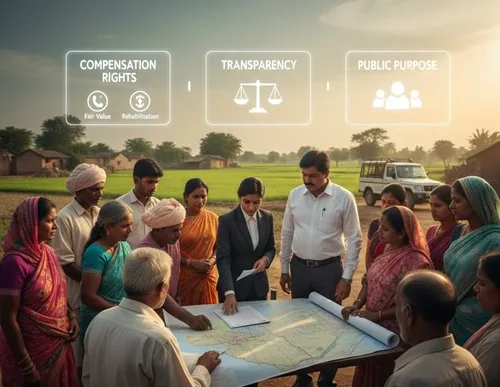
The Right to Fair Compensation and Transparency in Land Acquisition, Rehabilitation and Resettlement Act, 2013 (LARR Act) protects landowners and affected families from unfair or forced land acquisition. It replaced the old Land Acquisition Act, 1894, ensuring that when the government or private entities acquire land, people receive fair compensation, rehabilitation, and resettlement support.
Key Features of the LARR Act, 2013
| Feature | Description |
|---|---|
| Fair Compensation | Landowners must receive 2–4 times the market value — higher in rural areas. |
| Consent Requirement | 80% consent is needed for private projects and 70% for PPP projects. |
| Rehabilitation & Resettlement (R&R) | Affected families must get a house, job, or financial assistance. |
| Social Impact Assessment (SIA) | A mandatory study before acquisition to evaluate impact on people, livelihood, and the environment. |
| Protection for SC/ST Communities | Special safeguards for land belonging to Scheduled Castes and Tribes. |
| Time Limit | If land is not used within 5 years, it must be returned to the original owners or the state. |
| Transparency | All acquisition details must be published publicly and on government websites. |
State-Wise Implementation Examples
| State | Notification/Adaptation | Compensation Multiplier | Consent Requirement | Official Portal |
|---|---|---|---|---|
| Delhi | Central Act followed directly | 2× market value | 80% (Private), 70% (PPP) | delhi.gov.in |
| Maharashtra | Adopted with state-specific rules (2018) | Up to 2× (Urban), 4× (Rural) | 80% consent | maharashtra.gov.in |
| Tamil Nadu | Separate Land Acquisition Act (2019) for state projects | 1–2× | Consent not required for state projects | tn.gov.in |
| Gujarat | Adopted central law with modifications | 1–2× | 80% consent | gujarat.gov.in |
| Uttar Pradesh | Implemented LARR Act with amendments | 2–4× | As per central law | up.gov.in |
| Karnataka | Implemented with modifications (2019) | 2–4× | 80% consent | karnataka.gov.in |
FAQs – Land Acquisition, Rehabilitation & Resettlement Act, 2013
-
1. What is the purpose of this Act?
-
To ensure fair compensation, transparency, and rehabilitation when land is acquired for development projects.
-
2. Who can acquire land under this law?
-
The government, and in specific cases, private companies or PPP projects, but only with consent.
-
3. How is compensation calculated?
-
Market value × Multiplier (1–2) + 100% solatium (extra).
-
4. What consent is needed?
-
80% of landowners for private projects
70% for public-private partnership (PPP) projects -
5. What is a Social Impact Assessment (SIA)?
-
A mandatory study to check how a project affects local people, jobs, homes, and the environment.
-
6. Do only landowners get benefits?
-
No. Even tenants, agricultural labourers, and dependents on the land may get rehabilitation and resettlement (R&R) benefits.
-
7. What is offered besides money?
-
Affected families may receive a house, employment, or a monthly allowance, along with relocation support.
-
8. Can land be acquired without consent?
-
No, except in special cases like defence, national security, or emergency projects.
-
9. What if people don't agree to give consent?
-
The acquisition cannot proceed for private or PPP projects.
-
10. Is there special protection for SC/ST land?
-
Yes, extra safeguards, consent, and compensation are mandatory for Scheduled Castes and Tribes.
-
11. Can the land be taken urgently?
-
Only for defence, natural calamities, or national emergencies, with additional checks.
-
12. What if the acquired land isn't used?
-
If the land remains unused for 5 years, it must be returned to the original owners or re-acquired.
-
13. Are community and religious lands protected?
-
Yes. Such lands need special permissions, and alternative sites must be provided.
-
14. Does the law apply to forest or coastal land?
-
Yes, but only after environmental clearance and SIA approval.
-
15. Who ensures that rules are followed?
-
The District Collector and Rehabilitation & Resettlement Officers oversee the process.
-
16. Can compensation be challenged?
-
Yes, landowners can approach courts or the Land Acquisition, Rehabilitation, and Resettlement Authority.
-
17. Does this law cover industrial projects?
-
Yes, but only after completing consent, compensation, and SIA procedures.
-
18. Can private builders directly use this Act?
-
No. They must work through the government with the required consent.
-
19. Is this law applicable across India?
-
Yes, but states may issue amendments or rules for local implementation.
-
20. What was the old law before this?
-
The Land Acquisition Act, 1894, which lacked fair compensation, consent, and rehabilitation provisions.
Add new comment